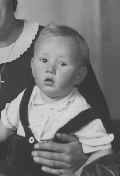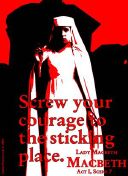Macbeth: Act 2
Analysis
Macbeth's famous soliloquy at the beginning of this act introduces an important theme: visions and hallucinations caused by guilt. The "dagger of the mind" that Macbeth sees is not "ghostly" or supernatural so much as a manifestation of the inner struggle Macbeth feels as he contemplates murdering Duncan. It "[marshals him] the way [he] was going," leading him toward the bloody deed he will do (II.i 50-54). The same can be said for the ghostly voice Macbeth thinks he hears as he kills Duncan. In fact, almost all the supernatural elements in this play could be (and often are) read as psychological rather than ghostly occurrences. If this is the case, then, one must question the role of the witches. Are they, too, products of Macbeth's fevered mind rather than real presences? The fact that they do no more that give voice to the ambitions Macbeth already harbors would seem to confirm this idea, but then there is the fact that Banquo also sees these witches and hears their prophesy in act one. Their role continues to be ambiguous throughout the course of the play.
The "dagger of the mind" is only one of many psychological manifestations in the play. While waiting for the opportunity to kill Duncan, Macbeth finds that he is unable to pray. A psychological literary analyst would read this as a physical inability to speak caused by Macbeth's paralyzing doubt about the correctness of the murder. The inner world of the psyche invades the physical world. The same can be said for the voice that Macbeth hears saying "Macbeth shall sleep no more" (II.ii 56). Freud analyzed his patients' dreams and interpreted them in order to provide an insight into the waking world. Macbeth cannot sleep; he is kept from the rest he needs by the guilt he feels over Duncan's murder. If he has consigned Duncan to eternal rest, he lives in eternal anxiety and torment over his bloody deeds.
Macbeth's troubled sleep is a metaphor for his troubled existence as well as the troubled state of the country. In Shakespeare's plays, the king was a symbol of the country he ruled. Therefore, if the king is troubled as Macbeth obviously is there are disturbances in the country. This kind of relationship between Macbeth himself and the country at large is seen in the conversation between Ross and an old man in scene four. The old man reports that "by the clock ’tis day, / And yet dark night strangles the traveling lamp" (II.iv 8-9). This image of the darkness strangling the light of day is a meteorological manifestation of the murder of Duncan; the light of nature is suffocated just as Duncan's life was extinguished. Victorian writer John Ruskin called this kind of mirroring of a character's psychological state in the weather and atmosphere the "pathetic fallacy." And the pathetic fallacy abounds in this play. The old man describes Duncan's two noble horses eating each other and an owl eating a falcon; these occurrences echo the slaughter of one noble man by another. The unnatural murder of Duncan plunges the country into physical as well as mental turmoil.
The image of an owl hunting a falcon is part of a greater framework of symbolism centered around birds in this play. For example, when Duncan approaches Inverness in act one, he comments on the martlets he sees nesting on the castle walls. He takes this as a good sign ˇ martlets are lucky birds. Lady Macbeth mentions earlier in this scene that there are ravens croaking on the battlements, and takes this as a harbinger of Duncan's death (I.v 45-46). Duncan, the trusting optimist, sees lucky birds, whereas Lady Macbeth sees fateful ones. Perhaps both are right ˇ in any event, "fair" certainly becomes "foul" for Duncan as the luck of the martlets he sees becomes the death foreseen by Lady Macbeth in the ravens. In act two, characters discuss or see birds in almost every scene. While Lady Macbeth is waiting for Macbeth to finish killing Duncan, for example, she hears an owl hooting and calls the owl a "fatal bellman," a bird whose call is like a bell tolling for Duncan's death (II.ii 5).
Throughout the play, dreams, fantasy, and imagination enter the "real world." The witches' words become truth. The "dagger of the mind" points the way to a murder done with a real dagger. And in the Porter scene (II.iii), a porter imagining that he guards the gate to Hell turns out to guard the gate to a real hell in which the king is actually murdered in his sleep. When he lets the thanes in, he mentions that he and his friends were out "carousing till the second cock" (II.iii 24). This statement calls to mind the cock that crowed in the Bible after Peter denied knowing Christ ˇ effectively turning on and from him by denying his association. In this story, Macbeth traitorously turns on Duncan and kills him, accompanied by the crowing of the cock. A metaphor becomes reality.





